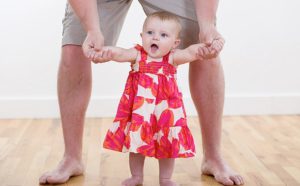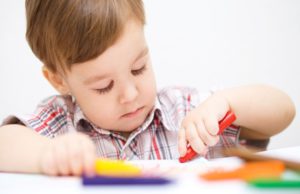Developmental milestones: What to expect from birth to age 3
Babies grow in unique ways: The baby who sits up weeks before her peers might be one of the last to learn how to crawl. Or the 18-month-old who’s still communicating with grunts and gestures suddenly bursts forth with prepositional phrases at 2 years. That’s why we created this series of developmental guides.
Since babies aren’t all the same, the guidelines allow for variations in stages of development. Use them to gain insight into what you’re observing in your baby today and to preview what you can look forward to in the months ahead.
Please note these are just guidelines and should you be worried about your little ones development, please speak to your doctor
Developmental milestones at 1 month
 The first days with your 1-month-old can be a blur of feeding, changing nappies, and sleep. But within a few weeks, they will start to take more notice of your voice, face, and touch.
The first days with your 1-month-old can be a blur of feeding, changing nappies, and sleep. But within a few weeks, they will start to take more notice of your voice, face, and touch.
They can lift their head briefly and turn it to the side when they are on their tummy, but when they are upright their head and neck still needs support. Although their arms move jerkily, they can get their hands close to their mouth.
Your baby can’t focus farther than 20 – 30 cms away – just the right distance for them to gaze at your face. Black-and-white patterns also draw their attention. Their hearing is fully developed and they might turn toward familiar sounds, such as your voice.
Your role
- Enjoy getting to know your baby: Cuddle them, talk to them, and learn how they signal when they are sleepy or hungry. Be attentive and responsive. You can’t spoil a baby!
- Make sure they get plenty of time outside. Go for walks with your little. They will enjoy the outdoors, relaxing with you, and being around other children.
- Give them plenty of tummy time from the start when they are awake. Tummy time can strengthen their muscles. Encourage them to look at and reach for toys.
- Play simple games with them.
- Get close and make eye contact with your baby when you talk, sing, and read to them.
Red flags
Each child develops at her own pace, but talk to your baby’s doctor if your 1-month-old:
- Doesn’t react to bright lights
- Feeds slowly or doesn’t suck well
- Doesn’t seem to focus her/his eyes or watch things moving nearby
- Doesn’t respond to loud sounds
- Seems especially stiff or floppy
Developmental milestones at 3 months
 By now, you are enjoying your baby’s delightful smiles! Your 3-month old enjoys playtime now, amusing you both when he imitates your facial expressions. He’s starting to babble and mimic the sounds you make.
By now, you are enjoying your baby’s delightful smiles! Your 3-month old enjoys playtime now, amusing you both when he imitates your facial expressions. He’s starting to babble and mimic the sounds you make.
You no longer need to support their head. When they are on their tummy, they can lift their head and chest, and even do the mini-pushups this develops their skills for rolling over. They can open and close their hands, shake toys, hit at dangling objects, bring their hands to their mouth, and push down with their legs if you hold them in a standing position.
Their hand-eye coordination is improving.
Your role
- Give your baby lots of loving attention. Talk to them throughout the day, describing what you’re doing and naming familiar objects. Read books together. Share cuddles, play games,
and encourage them to roll over, grab toys, and “talk” with you. - Continue to make tummy time part of their daily routine so they can practice their new skills and strengthen their muscles. When they have tummy time, give them toys that they can reach for, and hold.
- Don’t worry about spoiling your baby: Responding to them promptly helps them feel secure and loved. You can help them learn to self soothe by offering him a dummy.
Red flags
Each child develops at his own pace, but talk to your child’s doctor if your 3-month-old:
- Can’t grasp objects
- Can’t support his head well
- Can’t focus on moving objects
- Doesn’t smile
- Doesn’t react to loud sounds
- Ignores new faces
- Seems upset by unfamiliar people or surroundings
Developmental milestones at 4 to 7 months
 Your baby is fully engaged with the world now: They smile, laugh, and has babbling “conversations” with you. And they are generally on the move – by 7 months. They can probably roll to their tummy and back again, sit without your help, and they can support their weight with their legs well enough to bounce when you hold them. They uses a raking grasp to pull objects closer and can hold toys and move them from one hand to another.
Your baby is fully engaged with the world now: They smile, laugh, and has babbling “conversations” with you. And they are generally on the move – by 7 months. They can probably roll to their tummy and back again, sit without your help, and they can support their weight with their legs well enough to bounce when you hold them. They uses a raking grasp to pull objects closer and can hold toys and move them from one hand to another.
Peekaboo is a favourite game and they will enjoy finding hidden objects. They see the world in full colour now and can see farther. If you move a toy in front of them, they will follow it closely with their eyes. Watching themselves in a mirror is a delight for them.
Your baby is more sensitive to your tone of voice and may understand when you tell her “no.” they also know their name now and turns to look at you when you call them.
Your role
- Read together every day.
- Your baby thrives on the interactions that they have with you, so integrate play into everything you do with them.
- Give them lots of opportunities to strengthen her new physical skills.
- Provide a variety of age-appropriate toys and household objects (like wooden spoons or cartons) to explore.
- Work on establishing a routine for sleeping, feeding, and playtime.
Red flags
Each child develops at her own pace, but talk to your child’s doctor if your baby:
- Doesn’t reach for out objects
- Can’t hold their head
- Can’t sit on their own
- Doesn’t respond to noises or smiles
- Isn’t affectionate with those close to them
- Seems very stiff or floppy
Developmental milestones at 8 to 12 months
 Look at your baby go! They become an eager explorer, and it might surprise you how quickly they get around when they crawl. They can sit on their own now and they grab anything that they can to pull them up to stand and “cruise.” They might even take some steps before their first birthday.
Look at your baby go! They become an eager explorer, and it might surprise you how quickly they get around when they crawl. They can sit on their own now and they grab anything that they can to pull them up to stand and “cruise.” They might even take some steps before their first birthday.
Babbling sounds more like real.
Their hands are increasingly nimble: They amuse themselves by putting things in containers and taking them out again. They can use his thumb and finger in a pincer grasp to eat finger food. Your baby loves to be just like you by brushing their own hair, drinking from a cup, and pretending to talk on the phone.
While they may seem outgoing, you will find that they are reserved around strangers. Separation anxiety is normal at this age.
Your role
- Keep talking to your baby: This is a critical time for their language development.
- As they get more active, it’s important to provide a safe space to explore. They may not be walking quite yet, but you can help them get ready by holding their hand
- Pay attention to what they enjoy, and give them the freedom to use all their senses to play and discover.
- Be respectful of their separation anxiety:
Red flags
Each child develops at his own pace, but talk to your child’s doctor if your baby:
- Doesn’t crawl
- Can’t stand with support
- Seems to drag one side while they are crawling for a month or more
- Doesn’t use gestures, such as shaking his head “no” and pointing
- Doesn’t try to find objects you’ve hidden in front of them
- Doesn’t say any words
Developmental milestones at 13 to 24 months
 As you learn what milestones your toddler is likely to master this year, keep in mind that this is only a guideline. Each child is unique and develops at their own pace
As you learn what milestones your toddler is likely to master this year, keep in mind that this is only a guideline. Each child is unique and develops at their own pace
In his second year, your toddler will grow confident on his feet: Those first wobbly steps helped them develop those skills walk by themself, go up and down stairs, stand on his tiptoes, kick a ball, and maybe even run by the time they are turns 2. Or Before! Some kids don’t walk they run! Feel sorry for those moms!
They will also become quite the climber.
Their language skills are growing,
They quickly pick up new words from the books you read aloud to them and from hearing everyday conversations. They can follow two instructions, such as “Pick up your toy and bring it to me.”
Your toddler is starting to identify shapes and colours. They enjoy scribbling with a crayon, building towers of four or more blocks, throwing a ball, they also love filling and emptying containers. You might notice the first signs that indicate whether they will be left- or right-handed.
Your toddler wants to do everything themselves:
Separation anxiety peaks midyear, and by 24 months he’ll be more comfortable playing alongside other children and spending time with other caregivers..
Your role
- Help their verbal skills by putting feelings into words, posing questions, talking about the books you read together. Start teaching him letters and numbers.
- Encourage pretend play.
- Make sure they get plenty of time outside..
- Continue to encourage good behaviour with praise and attention.
Red flags
Each child develops at his own pace, but talk to your child’s doctor if your toddler:
- Doesn’t follow simple instructions
- Can’t walk by 18 months
- Doesn’t understand the use of everyday objects
- Loses skills he previously had
- Doesn’t speak at least six words by 18 months or two-word sentences by 24 months
- Doesn’t imitate words and actions
Developmental milestones at 25 to 36 months
 Keep in mind that this is only a guideline to what to expect from your preschooler this year. Each child is unique and develops at her own pace.
Keep in mind that this is only a guideline to what to expect from your preschooler this year. Each child is unique and develops at her own pace.
Your preschooler’s imagination is taking off: Playing make-believe is a must at this age, along with fears about imaginary monsters and more ordinary things such as the dark or the vacuum cleaner. They might have a hard time sorting out fantasy and reality.
Their speech is becoming clear. They should be able to follow a few instructions together. Their vocabulary is increasing daily and they will be using hundreds of words by the time they are 3.
They can walk up and down stairs, jump, and ride a bike with fairy wheels. Your preschooler is figuring out how to open doors and containers and can manipulate moving parts on toys. They can also draw a circle and complete simple puzzles.
You’ll see them starting to develop friendships. They are getting the hang of taking turns and sharing, but may struggle with tantrums when their emotions get the best of them.
Your role
- Provide your child with lots of opportunities to play with kids their own age. Give them a chance to resolve fights with their friends, but be ready to step in and facilitate sharing or taking turns. They will need help figuring out how to solve problems and how to handle her emotions.
- Play learning games
- Set simple and clear limits and follow through with consequences calmly and consistently. Be sure to praise them if they behave well.
- Now the potty training will start.
Red flags
Each child develops at her own pace, but talk to your child’s doctor if your preschooler still:
- Struggles with separation anxiety
- Can’t throw a ball or jump
- Doesn’t interact with people outside their family
- Doesn’t play with other children
- Avoids eye contact
- Can’t climb stairs with alternating feet
- Doesn’t use more than three words in a sentence
- Has trouble scribbling
- Doesn’t do basic self-care, like getting dressed or going to sleep
- Isn’t able to complete a sentence
- Is often difficult for strangers to understand when they talks
- Loses skills they previously had
- Doesn’t play make-believe
